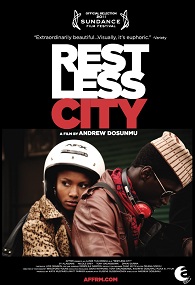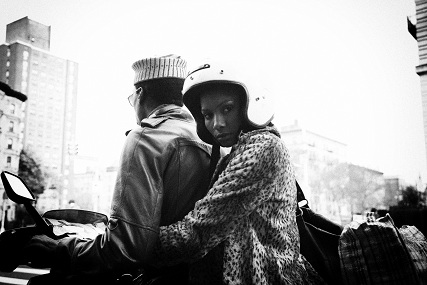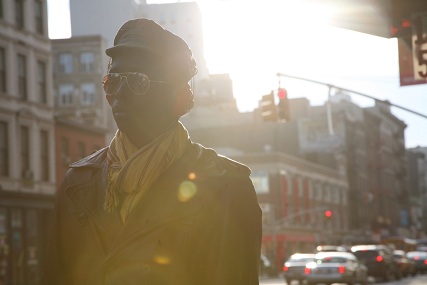 New York is the unofficial "capital of the world," home
to almost every ethnicity and nationality one can imagine. The often under-told classic tale of the
immigrant living in New York is what drives the new Sundance Festival
award-winning film Restless City
directed by Andrew Dosunmu.
New York is the unofficial "capital of the world," home
to almost every ethnicity and nationality one can imagine. The often under-told classic tale of the
immigrant living in New York is what drives the new Sundance Festival
award-winning film Restless City
directed by Andrew Dosunmu.
Dosunmu, a native Nigerian, is an acclaimed international photographer and award-winning documentarian. Restless City is Dosunmu's first feature film and follows the life of Djibril, a Senegalese immigrant with dreams of being a successful singer. The film is set in Harlem, New York, within the section affectionately known as 'Little Senegal.' The time period of the film appears to be present day, but the costume design of the cast and sepia overlay of the film rendered it ambiguous.
Djbiril
lives with several roommates and, for income, sells CDs on the street during the day. The tight-knit
community of West Africans in New York's uptown is evident as Djbril traverses through his
day. We soon meet Bekay (Tony Okungbowa),
Djbiril's CD supplier and neighborhood purveyor of beautiful women. Although not explicitly mentioned, Bekay may
also be the purveyor of illegal substances.
Djbiril's mode of travel is a red Honda scooter, festooned with pictures of both his homeland and family. He is also always adorned with his vintage red headphones, which are his constant reminder that music is still his passion. A scene early on in the film shows Djbiril promoting his original music to a young lady at his vendor table.
Later that night, Djbiril heads to a party with his friends, where
concerns are raised regarding a mutual compatriot Midi (Ese Daniel Ovueraye).
Midi has not been seen by anyone in a few days and rumors of irrational
behavior are swirling. The party scene is exhilarating with pulsating African
beats and rhythms flowing as the chicly-dressed patrons dance away.
 Trini, played by Nicole "Sky" Grey, is the love interest of Djbirl
in Restless City. As Trini rocks to
the music, Djbiril is observing every move her body makes on the dance
floor. She is amongst a group of women,
all who have accompanied Bekay to the party. The party is soon disrupted by
violence as a masked Midi sneaks inside and shoots into the crowd - a scene
without rhyme or reason. Midi then seeks refuge in the house of the neighborhood beautician,
Sisi (Danai Gurira). Midi freshens up and hides the gun in Sisi's couch.
Puzzling to all who viewed the scene, it will be last we see of Midi for the remainder
of Restless City.
Trini, played by Nicole "Sky" Grey, is the love interest of Djbirl
in Restless City. As Trini rocks to
the music, Djbiril is observing every move her body makes on the dance
floor. She is amongst a group of women,
all who have accompanied Bekay to the party. The party is soon disrupted by
violence as a masked Midi sneaks inside and shoots into the crowd - a scene
without rhyme or reason. Midi then seeks refuge in the house of the neighborhood beautician,
Sisi (Danai Gurira). Midi freshens up and hides the gun in Sisi's couch.
Puzzling to all who viewed the scene, it will be last we see of Midi for the remainder
of Restless City.
Djbiril obtains a second job as a messenger delivering mail and
packages, putting his scooter to "good" use. He starts delivering items for Bekay.
Djbiril's frequent trips to Bekay's
apartment is what eventually sparks a cordial relationship between he and Trini.
Djbiril seeks to just have conversations with Trini, yet never has too much to
say.
In fact, in Restless City, the dialogue is sparse and there are
many periods of silence. Regrettably, these sacred silences were not capitalized upon by the
actors whose facial expressions and body language left much to be desired. As
in life, the loudest messages conveyed can be the ones never verbalized.
A poignant exchange characterized by dialogue, however, occurred between Djbiril and Trini in her apartment. Djbiril demands to know why Trini stays with Bekay and gives him her body. The scene is a heated conversation ending in Trini throwing him out. The juxtaposition of the characters within the scene and the odd camera angles accentuated the scene's gravity. The film's cinematography was nothing short of phenomenal as award-winning cinematographer Bradford Young cast non-traditional shots through windows, mirrors, railings, etc. This sort of unique framing kept viewers critically engaged.
Ironically, as screenwriter Eugene Gussenhoven would have it, the very motivation for
Djbiril's life in New York is only engaged once in the film when he visits a
production studio. We never hear or see him perform, though.
 The setting of Restless City
in New York is integral to the overall theme of the movie.
The setting of Restless City
in New York is integral to the overall theme of the movie.
Throughout the film, even in the silent periods, the noise of the
city is clearly heard. Whether it was the rattling of an underground subway
or the cacophony of city traffic, it all served as a constant pulse within the
film, connoting motion and hustling. For Djbiril, it symbolizes a
never-ending grind to survive and make ends meet. Djbiril is seen sleeping or
at rest only once within the film, otherwise he is on his scooter ever in
motion.
The name of the movie takes on another meaning with respect to
the overall storyline of the film.
Restless City seems to supply a few more questions than answers for the
audience. We never find out what happens to Midi or why Bekay was looking for
him. The background to Trini's story is never dealt with, thus we are left to
make our own assumptions of how she arrives in New York and begins working for
Bekay. The time period of the film is left ambiguous. The holes in the story
definitely provide no rest for the average viewer, culminating in a sort of
self-fulfilled prophecy of a "restless city." I credit Andrew Dosunmu on his
first feature film.
AFFRM.com will release the 2011 Official Sundance Selection in theaters, beginning April 27, 2012. The film will debut in NY, LA, and ATL on April 27, and then expand to Philly, Seattle, Detroit, Chicago and Washington D.C. on May 4.
However, coupling the excellent cinematography with further character development, Restless City would be a much more profound and gripping movie. I rate it: 3 New Yorks.
![]()

